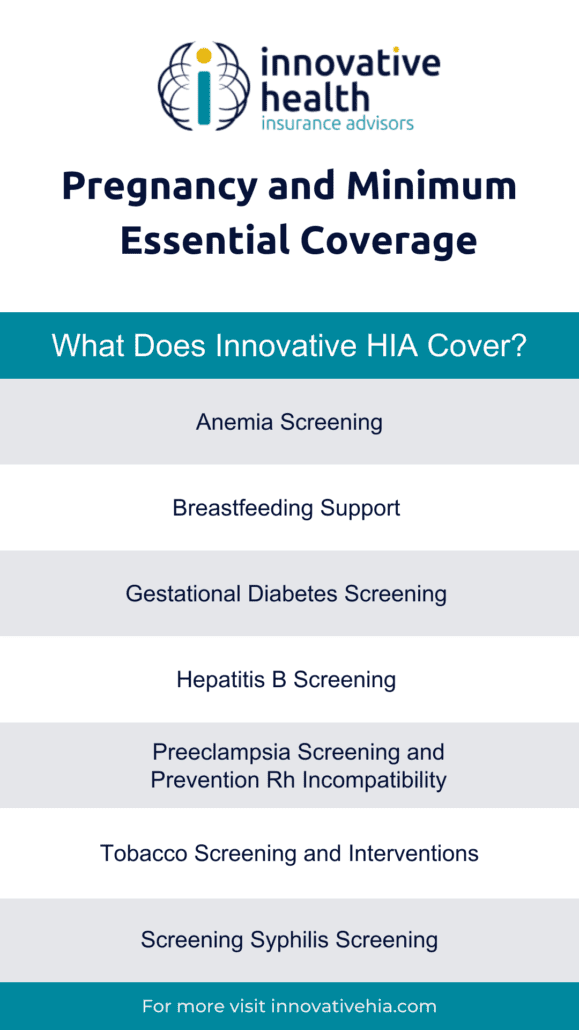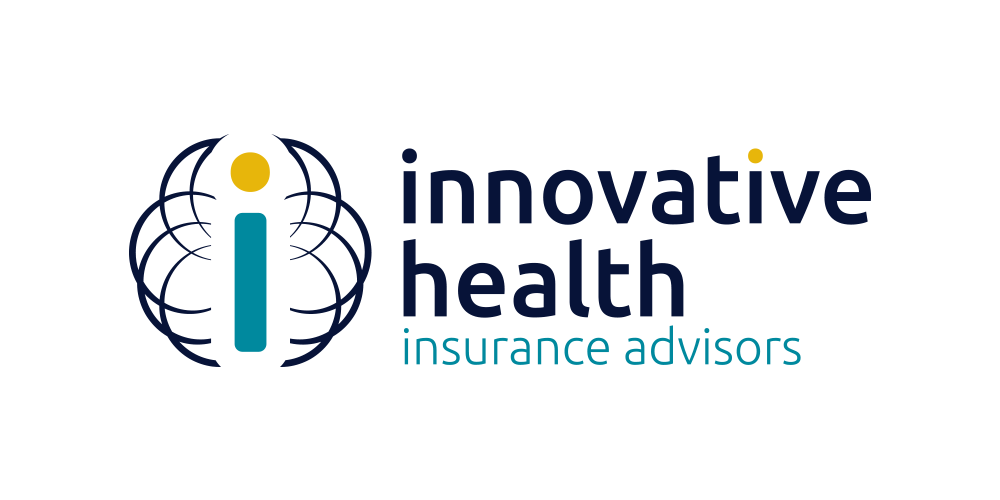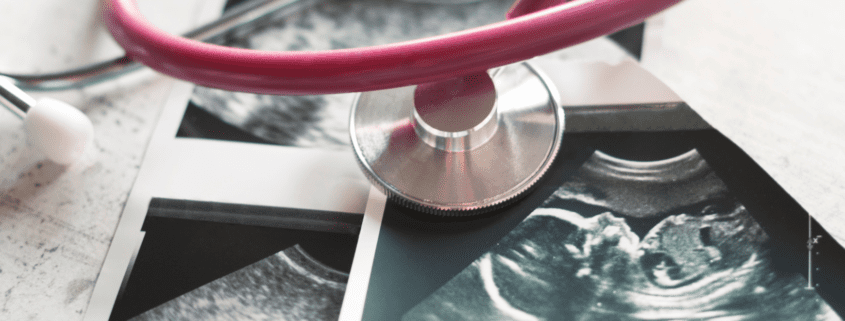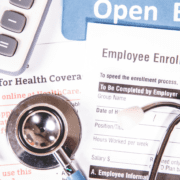Pregnancy and Minimum Essential Coverage
Innovative HIA’s Minor Medical plan (also known as Minimum Essential Coverage) provides expecting mothers the resources to screen for potential risk factors that impact the mother and baby. Some conditions or complications that arise during pregnancy are not easily recognizable and may require screening and testing for a diagnosis. It’s important to routinely check on you and your baby’s health so that if complications arise, your healthcare team is prepared to support your prenatal care. Learn more about pregnancy and minimum essential coverage – what we cover and why it’s important for you and your baby’s health in the short and long term.
What Does Our Minimum Essential Coverage Plan Include for Pregnant Women?
- Anemia screening on a routine basis for pregnant women
- Breastfeeding comprehensive support and counseling from trained providers, and access to breastfeeding supplies, for pregnant and nursing women
- Gestational diabetes screening for women 24 to 28 weeks pregnant and those at risk of developing gestational diabetes
- Hepatitis B screening for pregnant women at their first prenatal visit
- Preeclampsia prevention and screening for pregnant women and follow-up testing for women at higher risk
- Rh Incompatibility screening for all pregnant women and follow-up testing for women at higher risk
- Syphilis screening for all pregnant women or other women at increased risk
- Tobacco use screening and interventions for all women, and expanded counseling for pregnant tobacco users
What is Anemia?
Anemia is a blood condition where the blood does not have sufficient healthy red blood cells in the body. Red blood cells carry oxygen to your organs and your baby. This means, that reduced levels of red blood cells cause lower levels of oxygen going to your body’s organs and your baby. Symptoms can include fatigue, weakness, and dizziness.
During pregnancy, there are three types of anemia that can develop:
- Iron-deficiency anemia
- Folate-deficiency anemia
- Vitamin B12 deficiency
The most common type of anemia during pregnancy is iron-deficient anemia. In iron-deficiency anemia, the blood cells do not have enough iron in them to create sufficient amounts of the protein hemoglobin that carries oxygen itself on the red blood cell.
Therefore, the red blood cells cannot carry as much oxygen to the organs in the body, or the baby. Think of it like a train. The train with six carriages will transport double the amount of people in the same amount of time that a three-carriage train can.
Folate-deficiency anemia occurs when there isn’t enough intake of vitamin folate. Folate is a B vitamin found in food like broccoli and kale. It’s the basis for the body to make healthy red blood cells that can carry oxygen. Maintaining a consistently balanced diet replenishes folate levels in the body.
Vitamin B12 also helps the body create healthy red blood cells. Vitamin B12 deficiency limits the body’s ability to produce healthy red blood cells that circulate enough oxygen to you and your baby. Sources of B12 are found in meat, fish, and dairy products. Again, maintaining a well-balanced diet helps protect you and your baby from potential birth complications.
Why is Screening Important?
When screened for anemia, the test usually includes a hemoglobin test that measures the amount of iron-rich protein in the red blood cells and a hematocrit test that measures the percent of red blood cells in a blood sample.
Severe untreated anemia can lead to pregnancy complications and potentially preterm delivery. We cover anemia screening because we know the importance of catching and monitoring anemia during pregnancy for you and your baby’s safety.
Breastfeeding Support for Pregnant Women
After delivery, one of the first ways to assist women is through breastfeeding support and counseling. Both the American Academy of Pediatrics and the World Health Organization recommend women exclusively breastfeed infants for the first six months.
For women who choose to breastfeed their infant, our Minor Medical plan provides breastfeeding comprehensive support and counseling from trained providers. The support includes access to breastfeeding supplies for pregnant and nursing women.
According to the CDC, “research has shown that breastfeeding is recognized as the best source of nutrition for most infants.”
Breastfeeding counseling encourages and supports mothers during the breastfeeding process. They help the mother:
- Correct breastfeeding positioning, attachment, and effective suckling.
- Educate the mother on typical feeding behavior such as eating up to eight times a day, and signs such as rooting for when the baby is hungry.
- Encourage the mother to switch the breast used after each feeding.
- Reassure the mother that she will produce enough milk for her baby.
We encourage the use of trained providers through our Minor Medical benefits to plan to support mother and child during the important feeding process.
What is Gestational Diabetes and Why is Screening Important?
Our Minor Medical benefits plan covers gestational diabetes screening during the second trimester and for women at risk of developing gestational diabetes. During the 24-28 week period, the second trimester of pregnancy, the pregnant woman’s body is more resistant to insulin which makes glucose, sugar, and levels rise. Women who are obese before pregnancy, or have a family history of diabetes, are at a higher risk of gestational diabetes, which makes it important for them to receive screening as well.
Screening typically includes:
- Initial glucose challenge test – you drink a sugary solution and your blood is monitored an hour later to check if the levels are normal or out of range.
- Follow-up glucose tolerance test – if the first glucose test was high, a second glucose tolerance test is taken. This one requires blood level monitoring every hour for three hours.
It’s important to screen for gestational diabetes so you can prevent any possible future complications. If diagnosed, you and your provider can develop a treatment plan for you and your baby and monitor your health.
Complications for the baby:
- Excessive birth weight
- Preterm birth
- Breathing difficulties
- Low blood sugar
- Obesity or type 2 diabetes later in life
- Stillbirths
Complications for the pregnant woman:
- High blood pressure
- Preeclampsia
- C-section
- Future diabetes
Screening for gestational diabetes allows the mother and child to obtain the resources necessary to reduce complications in the future.
Read on for more information about minimum essential coverage.










